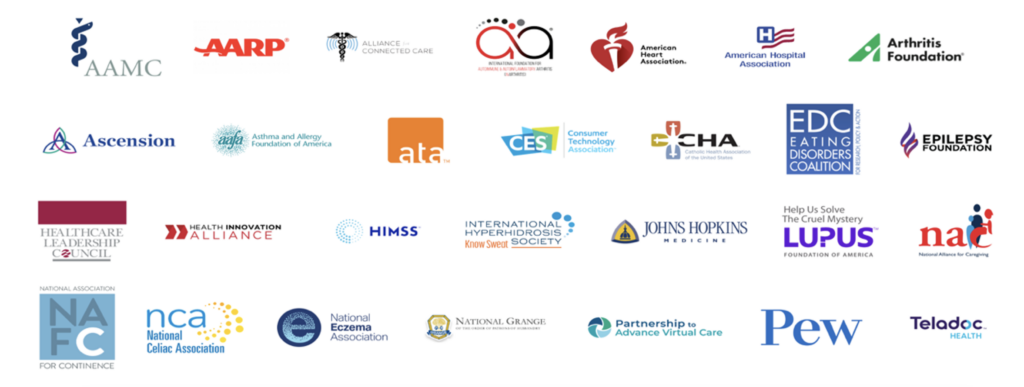Challenge
Lockdowns, unprecedented strain on health care facilities and fear of illness during the COVID-19 pandemic led millions of Americans to rely on telehealth to manage their health and receive care. Recognizing the need for expanded access to telehealth, the U.S. Department of Health and Human Services (HHS) and Centers for Medicare and Medicaid Services (CMS) suspended restrictions on virtual care through Public Health Emergency (PHE) waivers at the beginning of the pandemic. As a result, millions of patients, especially seniors, gained access to high-quality virtual care and health care organizations made significant investments in virtual care offerings to meet the COVID-19 demands and invest in the future of America’s health care system. The result was rapid innovation and adoption of telehealth. Telehealth provided a safe, convenient and affordable care option that increased access to care, expanded patient choice and improved health equity, quality of life and health outcomes. However, the flexibilities that expanded telehealth access were only in place for the duration of the COVID-19 PHE. Without action from Congress, patients faced a potential telehealth cliff. While there was almost universal support for pandemic-related telehealth flexibilities from key health care players, there were other areas of telehealth policy that divided stakeholders — and no unified public affairs effort in support of extending the flexibilities everyone agreed were critical. To meet this challenge, elevate the urgency for action, frame the Beltway conversation and build bipartisan consensus to safeguard access to virtual care, our firm worked with leaders in health care to establish Telehealth Access for America (TAFA) — a public affairs campaign dedicated to extending critical pandemic-era telehealth flexibilities.
Solution
The core strategy for TAFA was to provide always-on public affairs advocacy and air cover to help create the conditions for success in passing an extension of critical telehealth flexibilities in Congress by the end of 2022. On behalf of TAFA, our firm executed an aggressive communications strategy to educate the media, target members of Congress on committees of jurisdiction, and a D.C. influencer audience on the need and support for action to protect virtual care. A core component of the strategic approach our firm crafted for TAFA was to consistently elevate the voter-patient-constituent-consumer perspective in the debate, by securing and highlighting consumer stories, supporting advocacy among consumer allies and members, amplifying key data and developments in the media, and communicating directly with a target audience of key policymakers and influencers.
Results
TAFA’s establishment of a diverse coalition of supporters representing critical consumer voices and every sector of health care, and deployment of a robust public affairs campaign helped contribute to unprecedented bipartisan momentum for action and the passage of critical solutions to protect telehealth in Washington, D.C. In July 2022, the U.S. House voted to extend TAFA-supported telehealth flexibilities by a margin of 416 to 12 — demonstrating the overwhelming bipartisan, and nearly universal, support for telehealth achieved in an otherwise sharply divided Washington, D.C. Then, in December 2022, both chambers of Congress passed a two-year extension of critical telehealth flexibilities as part of bipartisan end-of-year omnibus legislation. President Biden signed these telehealth protections into law on December 29, 2022, averting a potential telehealth cliff for millions of Americans and safeguarding their access to virtual care through the end of 2024. For our work, we won PRWeek’s Healthcare Award for Best in Public Affairs and a Reed Award for Best in Public Affairs.
Grew from two to 26 member organizations in one year.






